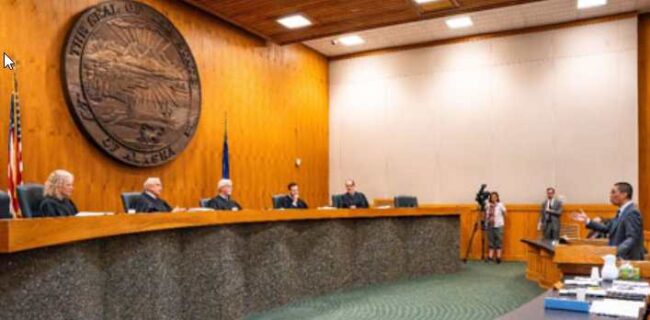
Photo by Patty Sullivan, AK Dept. of Law
Friday, the Alaska Supreme Court upheld Alaska’s correspondence school allotment program, allowing more than 22,000 students and families enrolled in the program to breathe a sigh of relief.
The Court reversed a Superior Court ruling that had struck down Alaska’s correspondence school statutes as unconstitutional, restoring the program as it has existed for the last ten years.
“This is a huge win for public education and a huge win for families,” said Alaska Governor Mike Dunleavy. “The Court got it right on this one. We were confident that the statutes were always constitutional. We thank the Alaska Supreme Court for their prompt decision in favor of the state. Correspondence programs/ homeschool programs can continue in their entirety. This gives certainty to thousands of parents, nearly 23,000 students, and thousands of vendors for 29 school districts who help support public education.”
Alaska has had a correspondence school program since before statehood. It has been an important public education option for all Alaskans—and a necessity for many Alaskans living in remote areas. In 2014, the Alaska Legislature amended the correspondence school statutes to codify existing regulations in addition to other changes. Notably, the legislation expressly permitted parents to purchase educational services and materials from private organizations.
“The Alaska Supreme Court clearly saw the flaws in the prior decision and in the plaintiffs’ arguments,” explained Alaska Attorney General Treg Taylor. “To strike down the entire statutory scheme on the allegations of one type of unconstitutional spending does not comport with the laws of statutory and constitutional interpretation. Statutes are presumed constitutional and there must be a high bar to strike them down. This is a win for the rule of law as well as Alaskan families.”
“I am extremely happy for the Supreme Court’s ruling as correspondence homeschools play a significant role in Alaska’s educational landscape,” said Deena Bishop, Commissioner of the Alaska Department of Education and Early Development. These programs provide vital educational opportunities for families across our state, especially in rural and remote areas where traditional schooling options are limited. Correspondence homeschools offer a flexible, adaptive, and culturally responsive approach to education, ensuring that every Alaskan student has the chance to succeed. The stability this ruling provides allows families to plan for their children to engage in an excellent education every day—which is our mission for all Alaska’s children.
Last year, a group of parents, backed by the National Education Association, filed suit against the Department of Education and Early Development challenging the facial constitutionality of the 2014 statutes. These plaintiffs argued that spending public funds at private organizations violated Article VII, Section 1 of the Alaska Constitution—specifically the direction that “[n]o money shall be paid from public funds for the direct benefit of any religious or other private educational institution.”
DEED argued in response that most, if not all, of the spending authorized by the statutes was clearly constitutional, including things like buying textbooks, notebooks, and computers from vendors like Amazon and Best Buy, hiring private music tutors and art teachers, and buying course materials from a wide variety of private businesses. As a result, DEED argued that the plaintiffs needed to challenge specific spending decisions—in an as-applied challenge—approved by particular school districts, rather than bringing a facial challenge.
The Alaska Supreme Court issued a summary order today with a full decision to follow in the future explaining its reasoning.
# # #
